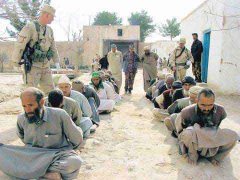
This article was last updated on April 16, 2022
Canada: ![]() Oye! Times readers Get FREE $30 to spend on Amazon, Walmart…
Oye! Times readers Get FREE $30 to spend on Amazon, Walmart…
USA: ![]() Oye! Times readers Get FREE $30 to spend on Amazon, Walmart…
Oye! Times readers Get FREE $30 to spend on Amazon, Walmart…
 In stunning testimony before the Canadian Parliament Richard Colvin the former senior most Canadian intelligence bureaucrat in Afghanistan provided details of how the Canadian government likely condoned the torture of each and every Afghan national initially detained by Canadian troops and then handed over to Afghan authorities.
In stunning testimony before the Canadian Parliament Richard Colvin the former senior most Canadian intelligence bureaucrat in Afghanistan provided details of how the Canadian government likely condoned the torture of each and every Afghan national initially detained by Canadian troops and then handed over to Afghan authorities. According to Colvin the most common forms of torture were beatings, whipping with power cables, the use of electricity, knives, open flames and rape.
In a hearing room in which there was pin drop silence Diplomat Richard Colvin who is now the deputy chief of intelligence at the Canadian Embassy in Washington D.C. said that in 17 memos written over a seventeen month period he had provided details of the torture of Afghan civilians.
The memos were circulated to up to 75 senior Canadian military officers, foreign ministry officials and even the most senior bureaucrats in the office of the Canadian Prime Minister Stephen Harper including his then national security advisor Margaret Bloodworth.
Colvin testified that the detainees were not “high-value targets” such as IED bomb makers, al-Qaeda terrorists or Taliban commanders.
“According to a very authoritative source, many of the Afghans we detained had no connection to insurgency whatsoever,” Colvin insisted. “From an intelligence point of view, they (the detainees) had little or no value.”
Colvin said while some of the Afghan detainees may have been foot soldiers or day fighters many were just local people farmers and taxi drivers – at the wrong place at the wrong time.
“In other words, we detained and handed over for severe torture a lot of innocent people” Colvin said
Prime Minister Harper who is visiting India was unavailable for comment and calls to the Privy Council Office were not returned.
Rick Hiller who is the former commander of Canadian Forces also did not return calls though in his recently published book Hiller denies that troops under his command were aware of torture of persons detained by Canadian troops.
Then Minister of Defence Peter Mackay refused to comment on the allegations,
According to Colvin, initially, Canadian officials both in Afghanistan and Canada simply ignored his warnings. By April 2007, however Colvin and three colleagues who had similar concerns observed “extremely irregular” conduct by senior Canadian official including receiving written messages that in the future reports should not be put on paper but instead reported by telephone.
Colvin cited David Mulroney, a deputy minister who is now Canada’s ambassador to China, as one of the officials who didn’t want to hear the allegations.
Colvin said with the arrival of ambassador Arif Lalani in April 2006 the paper trail on detainees was reduced and reports on detainees were at times “censored” with crucial information removed.
Colvin said unlike the British and Dutch, Canada did not monitor the condition of the prisoners. Canada also took days, weeks or months to notify the Red Cross and kept poor records. Colvin alleged that in order to prevent scrutiny, the Canadian Forces leadership concealed this behind “walls of secrecy.”
In conclusion Colvin said “as I learned more about our detainee practices, I came to a conclusion they were contrary to Canada’s values, contrary to Canada’s interests, contrary to Canada’s official policies and also contrary to international law. That is, they were un-Canadian, counterproductive and probably illegal.
Viresh Fernando is Canadian lawyer and freelance journalist and can be reached at viresh@oyetimes.com
You can publish this article on your website as long as you provide a link back to this page.

Be the first to comment